In Search of Nellie Bly: America’s Pioneering Investigative Journalist
By Brooke Kroeger | On January 10, 2019 | Updated October 7, 2021 | Comments (0)
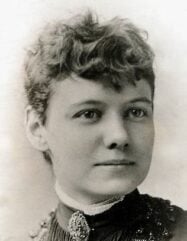
Excerpted from Nellie Bly: Daredevil, Reporter, Feminist by Brooke Kroeger, the most comprehensive biography to date on the pioneering investigative journalist, born Elizabeth Jane Cochran (she later spelled her name Cochrane) on May 5, 1864, in Cochran’s Mills, Pennsylvania:
Nellie Bly was one of the most rousing characters in the late nineteenth and early twentieth centuries. In the 1880s she pioneered the development of “detective” or “stunt” journalism, the acknowledged forerunner of full-scale investigative reporting.
While she was still in her early twenties, the example of her fearless success helped open the profession to coming generations of women journalists clamoring to write hard news.
Accomplished the extraordinary as a matter of course
Bly performed feats for the record books. She feigned insanity and engineered her own commitment to a mental asylum, then exposed its horrid conditions. She circle the globe faster than any living or fictional soul.
She designed, manufactured, and marketed the first successful steel barrel produced in the United States. She owned and operated factories as a model of social welfare for her 1,500 employees.
She journeyed to Paris to argue the case of a defeated nation. She wrote a widely read advice column while devoting herself to the plight of the unfortunate, most notably unwed and indigent mothers and their offspring.
Bly’s life — 1864 to 1922 — spanned Reconstruction, the Victorian and Progressive eras, the Great War and its aftermath.
She grew up without privilege for higher education, knowing that her greatest asset was the force of her own will. Bly executed the extraordinary as a matter of routine …
. . . . . . . . . .

Nellie Bly: Daredevil, Reporter, Feminist by Brooke Kroeger
. . . . . . . . . .
An indomitable will, an incredible life story
To admirers, she was Will Indomitable, The Best Reporter in America, the Personification of Pluck. Amazing was the adjective that always came to mind.
As the most famous woman journalist of her day, as an early woman industrialist, as a humanitarian, even as a beleaguered litigant, Bly kept the same formula for success: Determine Right. Decide Fast. Apply Energy. Act with Conviction. Fight to the Finish. Accept the Consequences. Move on.
It is baffling that a life of such purpose and accomplishment — still daunting, even by the contemporary standard —did not incite the passions of any number of serious authors over the years.
Even if none of the more commercially successful biographers sensed the essential universality of Bly’s dramatic story, at least it should have snared the narrative the imagination of a feminist scholar or two, a doctoral candidate perhaps.
An affecting and inspiring nonfiction heroine
And yet, the Library of Congress catalog is without one documented biography of Nellie Bly … more disturbing is the puny place she occupies insured was in histories, which dismissed her with this sentence, maybe a paragraph.
Biographical sketches still appear in academic works and in the literary and women’s biographical dictionaries however. And Bly’s exemplary story has inspired over the past half-century at least a score of juvenile books.
As a girl of ten, I happen to read one of them. Bly’s story had a greater impact on my life than that of any other nonfiction heroine.
I hadn’t thought about Bly in years, but when my daughter, Brett, turned ten in 1986, I wanted to introduce her to the real-life character who had affected me so deeply.
We had moved to New York two years before, and I thought a book length encounter with Mother’s patron saint would help her make sense of the hopscotch childhood she had been subjected to between the ages of three weeks and eight years.
In that time, Brett had lived in Brussels, London, Tel Aviv (with weekends in the Gaza Strip), and London again. It’s suddenly became very important to locate that book and share with her.
. . . . . . . . . .
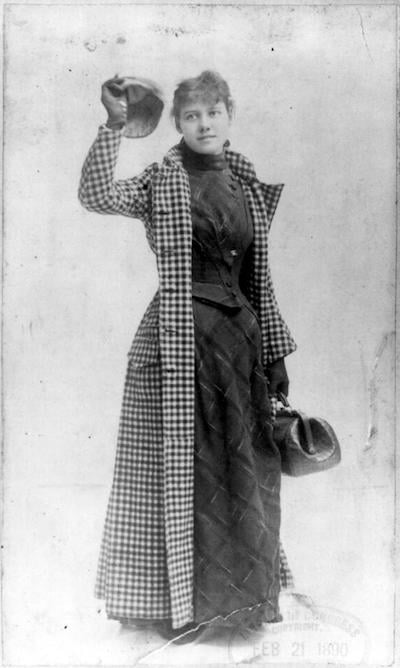
Bly gained worldwide fame for her 1889 “Around the World in 72 Days” journey;
she outdid the fictional version in Around the World in Eighty Days by Jules Verne
. . . . . . . . . .
Relegated to virtual obscurity
That is when I first became conscious of Bly’s near invisibility. Judging from what was available in the bookstores, nothing has come along to replace those early biographies.
From the reference librarians at the Library of Congress, I learned of the two Bly biographies that had been published in the 1950s in addition to the one I had read as a child, and that numerous others had come out sense.
Through a search firm, I obtained a 1971 reprint of Mignon Rittenhouse’s The Amazing Nellie Bly and Jason Marks’s The Story of Nellie Bly.
In the main branch of the public library in Kansas City, I found the other two from the 1950s, Iris Noble’s incorrectly titled Nellie Bly: First Woman Reporter and Nina Brown Baker’s Nellie Bly.
I also found two fairly extensive juvenile biographies written as recently as 1989: Making Headlines: A Biography of Nellie Bly by Kathy Lynn Emerson and Nellie Bly by Elizabeth Ehrlich.
Brent and I read the books. She grew interested enough to turn Bly into a research project for school a few years later. We found that though all these books covered much the same ground, none of them agreed on any of the most basic facts of Bly’s life, right down to the dates, ages, and spellings of important names, including hers.
None seem to have been based on much primary material. I began to think that there wasn’t much primary material. Brett thought I should find out …
. . . . . . . .
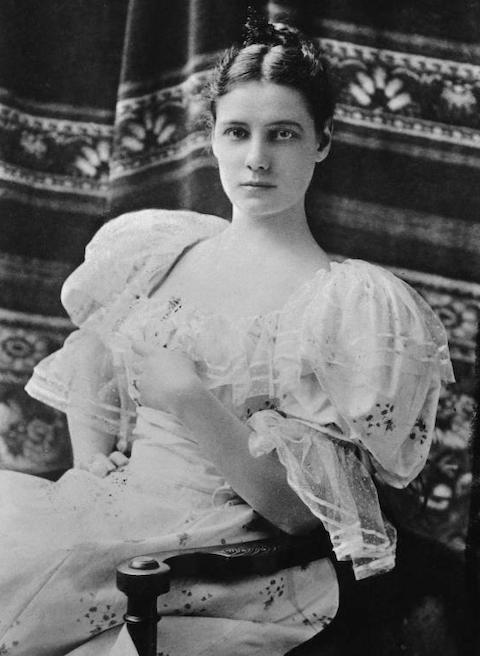
. . . . . . . .
Poor planning for posterity
Bly’s error seems to have been leaving behind a substantial written record to which there would be ready access. Given the circumstances at the end of her life this was probably not by design. But the fact is, no diaries or journals of hers has surfaced.
When I begin this project, there were only seven letters of hers — six at the Carnegie Library in Pittsburgh and one in the Sofia Smith collection at Smith College. The only family memorabilia, assembled by her grandnephew James Agey, disappeared after his death in 1981.
The results of this situation has been that when ever the noon details of Bly’s life have been summoned for those passing references in journalism histories or for sketchy biographical profiles, they have always derived from the same anorexic body of sources …
The problem with Bly’s legacy, then, was poor planning for posterity. Guaranteeing a place in history, it seems, takes more than living a phenomenal life. In most cases, it takes careful attention to creating a documented record of that life that isn’t too hard to retrieve.
Retrieving a life
It began to make sense why the life of Nellie Bly had been relegated to the fascination of little girls — and fear and fewer of them as time passed, with limited circulation of those juvenile books.
Bly’s was an amazing story, but as a subject of serious inquiry, simply not cost-effective. Scholarship, then was not going to be the impetus for her historical rescue.
Alternative motivation was required: a quirky, even maniacal devotion to her memory, perhaps; and an intuitive believe that, in the end, she would have turned out to have been worth the bother.
By tracing Bly’s Life trail backward through the layers of accepted lore and faulty secondary information, drilling for the closest primary source, I attempted to eliminate all the confusing factoids about her.
Most of these have emerged from incorrect information in books, and newspaper and magazine articles over the years, which had gained credence through repetition.
Some came from sections the early biographers supplied to fill in gaps. Census records helped clarify dates and family circumstances, as did old county and family histories, however flawed.
I found enlightening paragraphs about Bly in the memoirs of some of her colleagues and in biographies of them.
Combing through all of those old newspapers on microfilm, page by page by page, I have compiled as complete a record as possible of Nellie Bly, Working Reporter, and have copies of all of those stories.
. . . . . . . .
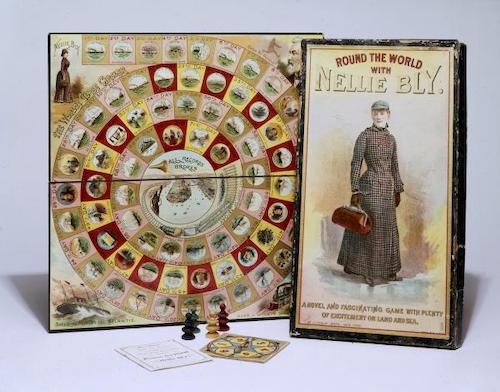
A board game inspired by Bly’s around-the-world journey came out in 1890
. . . . . . . . .
Clearing up myths
Several hunches paid off: For example, I located Bly’s baptismal record, which put the confusion Bly herself caused on the question of her birth date to permanent rest.
Thankfully, she was highly litigious. There was court testimony of hers on record from the time she was fourteen years old and records of lawsuits filed into her final years.
National, county, and municipal archives in all the places she lived, including Vienna, yielded information I only dreamed I would find, as did libraries, special collections, and historical societies all over the United States.
Although the numerous books on journalism in newspaper history tend to slight her, many have provided or confirmed important background information or inspired new ways of looking at Bly’s life, as her biographies of editors and publishers such as Joseph Pulitzer, William Randolph Hearst, John Cockerill, and Arthur Brisbane …
A woman’s life that deserves a lasting legacy
Now that the work is done, I remain convinced that Nellie Bly was worth the effort. She is an example of possibility, even still. Bly viewed every situation as an opportunity to make a significant difference in other people’s lives as well as her own.
Not wealth or connections or position or beauty or outstanding intellect eased her way to greatness. She never dwelled I’m in adequacy or defeat. Bly just harnessed her pluck, her power to decide, and then did as she saw fit, to both impressive and disaster ends.
My immersion in Bly’s life has triggered a dozen reactions — from delight to distaste. Her story is fascinating. She deserves a full and lasting legacy.
. . . . . . . . . .
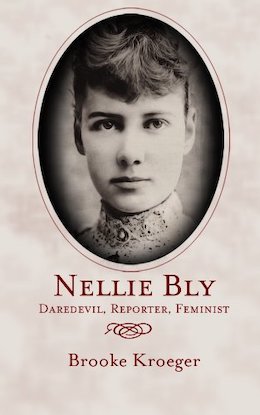
Nellie Bly: Daredevil, Reporter, Feminist by Brooke Kroeger on Amazon*
. . . . . . . . . .
Brooke Kroeger directs NYU Journalism’s graduate Global and Joint Program Studies and has been a faculty member since 1998. She was department chair from 2005-2011 and the Arthur L. Carter Journalism Institute’s inaugural director.
Her latest book, The Suffragents, chronicles the prominent, influential men whose support helped women get the vote. She is also the author of Passing: When People Can’t Be Who They Are, Fannie: The Talent for Success of Writer Fannie Hurst (1999), and others.
. . . . . . . . . .
For more … watch an animated (literally) Brooke Kroeger in Nellie Bly Makes the News, a colorful and fun video introduction to this amazing journalist.
*This is an Amazon Affiliate link. If the product is purchased by linking through, Literary Ladies Guide receives a modest commission, which helps maintain our site and helps it to continue growing!
Leave a Reply